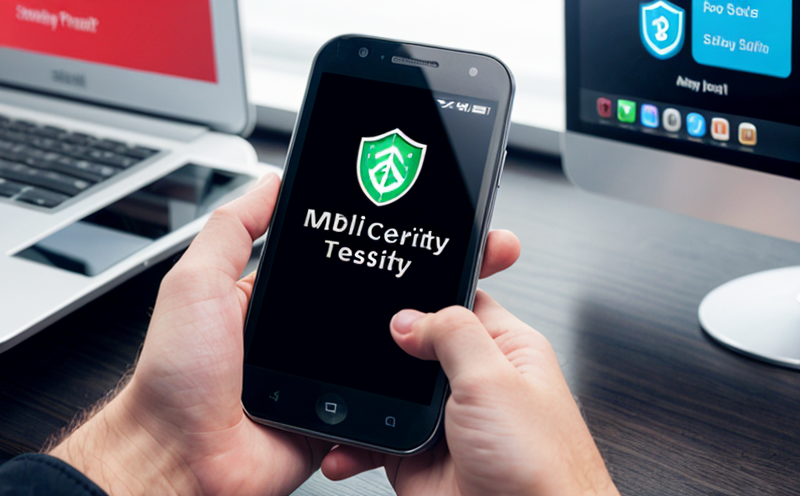OWASP API Security Testing in Mobile Applications
OWASP (Open Web Application Security Project) API security testing is a critical aspect of ensuring the integrity, confidentiality, and availability of mobile applications. As modern applications increasingly rely on APIs to communicate with backend systems, vulnerabilities in these interfaces can expose sensitive data and compromise user privacy.
The OWASP guidelines provide a comprehensive framework for identifying and addressing potential risks associated with API security. By adhering to these standards, organizations can protect their digital assets from unauthorized access and exploitation. This service focuses on the specific challenges faced by mobile applications when it comes to secure API communication, offering tailored solutions that align with industry best practices.
Mobile applications are often the endpoint for critical data exchange between users and backend services. Ensuring that these endpoints are robust against various attack vectors is essential for maintaining user trust and compliance with regulatory requirements. Our team of experts uses a combination of automated tools and manual techniques to conduct thorough testing, identifying not only known vulnerabilities but also potential threats unique to each application.
Our approach begins with an initial assessment of the API architecture, followed by detailed examination of authentication mechanisms, data encryption methods, error handling protocols, rate limiting strategies, and more. We simulate real-world attack scenarios to uncover weaknesses that may not be apparent through static analysis alone. Additionally, we provide recommendations for enhancing security controls based on our findings.
By leveraging the latest advancements in cybersecurity research and best practices outlined by OWASP, our services help organizations mitigate risks associated with API exposure while ensuring compliance with relevant standards like ISO/IEC 27034-1:2019. This ensures that both internal processes and external interfaces remain secure against emerging threats.
Our comprehensive methodology not only addresses immediate concerns but also helps establish long-term strategies for continuous improvement in API security. Through regular audits and updates, we ensure that your applications stay protected as threat landscapes evolve over time.
Why It Matters
The importance of OWASP API security testing cannot be overstated given the increasing reliance on mobile applications for business operations. A single breach could lead to significant financial losses, reputational damage, and legal liabilities. Therefore, it is crucial for organizations to invest in robust security measures that safeguard their digital assets.
Mobile apps frequently handle sensitive information such as personal data, payment details, or login credentials. If these inputs are mishandled at the API level, they can be intercepted or tampered with during transmission. Consequently, users risk losing control over their private information, which could result in identity theft or fraud.
Moreover, APIs serve as gateways between different parts of an organization's infrastructure, including cloud services, IoT devices, and third-party integrations. Any vulnerability within these interfaces can create entry points for attackers to compromise larger portions of the system. This makes API security testing not just a compliance requirement but also a strategic imperative.
Implementing effective OWASP API security practices helps organizations adhere to regulatory standards such as GDPR, HIPAA, and PCI-DSS. These regulations emphasize the need for strong encryption protocols, proper access controls, and regular monitoring of network activity. By incorporating these measures into your mobile applications, you demonstrate a commitment to protecting customer data and maintaining high ethical standards.
In summary, OWASP API security testing plays a vital role in safeguarding digital assets against unauthorized access and exploitation. It enables organizations to build resilient systems capable of withstanding evolving threats while fostering trust among stakeholders.
Industry Applications
| Application Type | Description | Risks Addressed |
|---|---|---|
| Financial Services | Involves transactions and sensitive user information. | Data theft, fraud prevention. |
| Healthcare | Manages patient records and medical history. | Patient privacy violations. |
| Telecommunications | Handles subscriber information and network configurations. | Unauthorized access to customer data. |
| Manufacturing | Controls factory automation systems and IoT devices. | Security breaches leading to operational disruptions. |
| Retail | Processes customer orders and payment details. | Payment card data compromise. |
Environmental and Sustainability Contributions
The implementation of OWASP API security testing contributes positively to environmental sustainability by reducing the likelihood of data breaches, which in turn minimizes the need for costly remediation efforts. By protecting sensitive information and preventing unauthorized access, organizations can avoid the unnecessary duplication of resources required to address incidents.
Additionally, adhering to strict security protocols helps foster a culture of responsibility towards stakeholders, promoting transparency and trust within communities. This aligns with broader sustainability goals by encouraging responsible technology use that respects user privacy and enhances overall quality of life.





